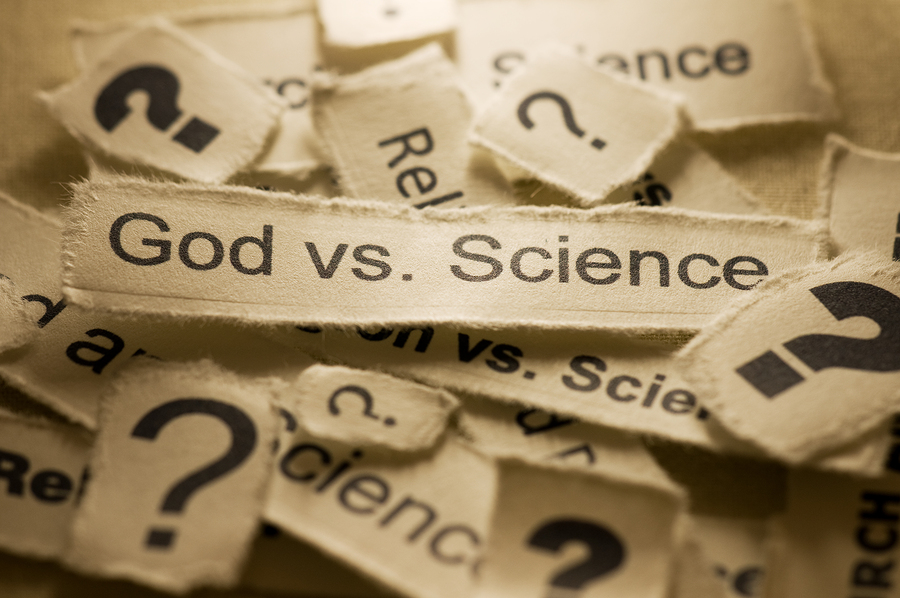
About the author : Antwuan Malone
Antwuan Malone is a Ministry Director at ELEVATE Young Adult Ministry (elevateministry.net) where empowers young adults toward Christian leadership. He is passionate about seeing young adults take their place in church history by drawing near enough to God to hear his call on their life, and courageously living in obedience to that call.
Doesn’t Science Disprove God?
Can’t science and God just get along? Apparently not.
Now more than ever, the claws are being drawn. Atheists are growing more and more mobile in this Information Age, and science is most often their weapon of choice. Christians, whether they like it or not, will face some version of this question: Doesn’t science disprove God? It’s inevitable.
So it behooves us to at least give it some thought. For me, like many of the tough questions we talk about, I like to center in on the wording.
Science
The problem with the reliance of science to reveal all things is that science is still ignorant. Or, maybe it’s better to say, science is still learning. We all know that scientific finds have propelled our society in great ways in the areas of technology, social policy, business, art, and many other facets of life. It is more than understandable to hold science to such a degree that all life’s experiences should be filtered through it. In fact, to do so is reasonable.
In fact, for all its discovery and investigation, experimentation and theory, science spells out a sort of faith story. And that faith story is anchored in the hope that all things are explainable, observable and therefore understandable. It hopes, with expectant certainty, that all real things can be known and proven. In this sense, science is perfect. Science is without flaw. Science is such a reliable mechanic that reality must be determined by its laws and practices. It is the absolute. The one thing in life no one can dispute. In a sense, science is a type of god. It is an undisputed set of ideas that all things must adhere to.
That creates a problem for me.
No scientist will admit this (they may not even see it this way). And atheists will probably sneer at this. But it is no less true. If God must be proven by science, this means God must succumb to the very laws of creation he created… which on many levels would not make him God at all.
Disprove
“If a tree falls in the forest, and nobody is there to hear it, does it make a sound?”
Proof is a tricky subject. Because proof is so thoroughly married to science, many see it is as the truth-teller. This, I think is a mistake. First off, there are many cases in courts across America won and loss on dishonest proof. That is, many an innocent man have been proven guilty, and vice versa. Proof, as it turns out, is overrated… or, at least over-trusted.
The idea that anything that truly exists will leave signs of its existence is, again, understandable, but incorrect. Criminals perform crimes that don’t leave a trace. Does the lack of evidence mean the crimes never happened? For thousands of years, we didn’t know about the Milky Way. Does this mean the Milky Way did not exist until we proved it? And what if we never proved it? Reality does not depend on proof. Reality exists whether we prove it or not. It does not wait for proof to validate its existence. If it exists, it exists.
Proof, then, is not only unreliable and unnecessary to real truth, but it’s also deniable. Proof relies on the general idea that reality holds no real surprises. Meaning, even when there is proof such as eyewitnesses and written witnesses, if that proof does not line up with what science has taught us to this point, it is rejected. Such was the case for nearly every major scientific and mathematical find in history.
Further, by our very definition of God, we should expect science would not be able to prove or disprove him. Again, doing so would make God as natural as everything else science observes. If he is, in fact, the God of the supernatural variety, we should not expect to find him through natural laws. If we found him using such laws, he’d prove to be natural.
I’ll end with this highly hypothetical example. If Super Mario (the video game dude) were to grow a consciousness in his video game world, should we expect that he would be able to prove we, the creators of his world, exists via the rules of the programming that created his game?If Mario found a way to understand how he came to be, and what his world is made of, and the rules by which it were made, would it be possible for him to find proof of its designers? And more, if he did, would he be able to understand the lives of those designers like the pressures of marriage, parenthood, having a career, rooting for a sports team, the fear of dentists, what Burger King is, or what an Ipod is? And if not, does it mean these designers (and the ways they live) do not exist?
It’s a ridiculous example only because it is ridiculous to expect Mario to know anything other than what we has been created to know. He has a world that makes sense to him, and we have a world that makes sense to us. And the only proof of a supernatural God we can expect is the sort of proof he allows us to have. And that, as I have mentioned, will probably break the rules of our scientific construct of reality.
Does science disprove God? Absolutely not. Does science prove God? Also, absolutely not.




